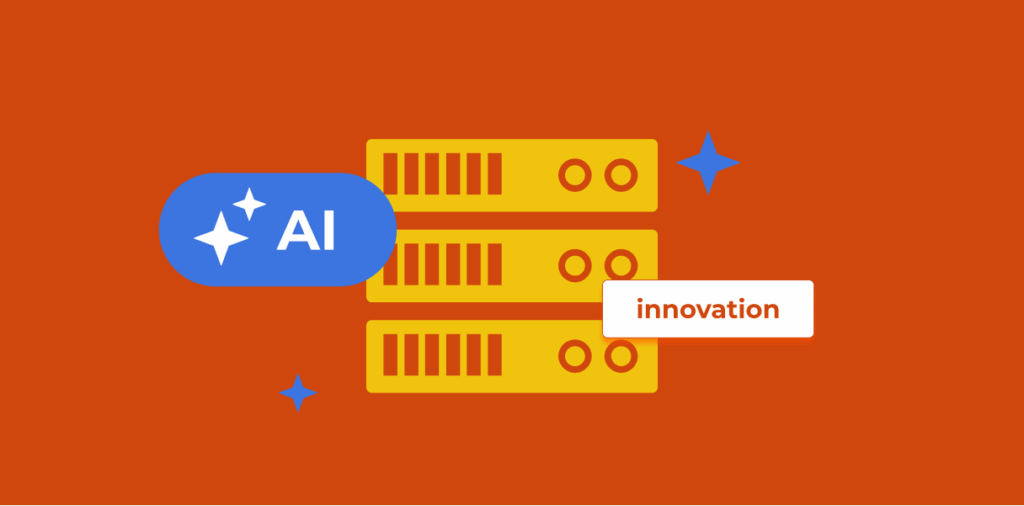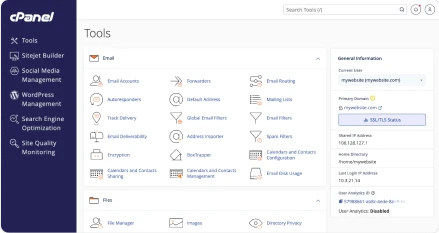The web hosting industry is undergoing a significant transformation, one that is fueled by a development that by now, you must be hearing and reading about literally every single day: AI.
Due to sustainability concerns, and demand for faster, more flexible infrastructure, hosting providers are reimagining how they deliver services, and what the future might look like (and how best to place themselves within it). From AI-powered support tools to decentralized hosting and edge computing, the future of web hosting promises greater automation, efficiency, and intelligence.
In this article, we’ll explore the latest trends, the role of AI in hosting and customer support, and what the next decade might bring.
Short Summary
- The web hosting industry is rapidly evolving with artificial intelligence (AI) playing a central role in transforming infrastructure, support services, and sustainability practices.
- AI enhances server efficiency, predicts hardware failures, strengthens cybersecurity, and revolutionizes customer support through intelligent chatbots and voice agents.
- Emerging technologies like edge computing, containerization, and serverless architecture are reshaping how hosting is delivered.
- The industry is moving toward greener practices, emphasizing renewable energy and energy optimization.
- The future of web hosting lies in a hybrid approach, leveraging AI for efficiency while maintaining human oversight for trust, compliance, and intuition.
What is AI Integration in Hosting?
AI integration in hosting refers to the use of artificial intelligence technologies to enhance, automate, and optimize various aspects of web hosting services. This can span infrastructure management, customer support, performance optimization, security, and user experience.
Artificial Intelligence is no longer a futuristic concept in hosting: it’s here, and it’s rapidly evolving. Hosting providers now use AI to automate routine tasks such as server monitoring, traffic load balancing, and threat detection. These intelligent systems can predict hardware failures, optimize resource allocation, and even respond to performance issues in real time, without the need for human intervention.
Optimizing Uptime With AI
In practical terms, AI enhances uptime and efficiency. An example of this is that AI-driven platforms can dynamically allocate resources during peak traffic times, ensuring websites remain fast and responsive. As AI technology continues to mature, hosting services will become even more self-sufficient and predictive.
Smarter Resource Management
AI enables dynamic allocation of server resources based on real-time demand. This ensures optimal performance even during unexpected traffic spikes.
Example: An e-commerce site running a flash sale used AI to instantly scale its infrastructure, maintaining fast load times and a smooth shopping experience.
Predictive Maintenance
By continuously analyzing server performance, AI can anticipate potential issues before they escalate.
Example: A hosting provider identified recurring server load spikes using AI analytics and addressed them proactively, preventing downtime and improving reliability.
Strengthened Security
AI enhances cybersecurity by detecting anomalies, identifying threats, and responding to attacks in real time. It can also monitor user behavior to flag potential insider threats and reduce system vulnerabilities.

How Can AI Help in Customer Support
Customer service is another area where AI is making a profound impact, not just in the hosting industry. AI-powered chatbots and voice agents are now capable of handling complex support queries, offering 24/7 assistance with response times that outperform human agents. These systems leverage natural language processing (NLP) to understand and resolve customer issues more efficiently. WebPros recently used AI to augment our Customer Support team, with some transformative results.
“Over a one-week period, the experimental group equipped with the semantic search engine saved a total of 46 hours compared to the control group. This improvement was equivalent to the workload of one full-time employee for every eleven support engineers. […] Overall, the combined benefits of implementing the solution for one of our products resulted in a workload reduction of approximately 10% across the entire Support Team.”
How semantic search transformed customer support at WebPros
Voice AI in Customer Support
Voice AI, in particular, is seeing rapid development. Modern voice agents integrate speech recognition and large language models to offer fluid, human-like conversations. However, this technology is not without its challenges. Companies that initially replaced hundreds of customer service agents with AI found that the lack of human empathy and problem-solving intuition still made human agents indispensable in certain situations.
Hybrid AI model for Customer Support
The future of support likely lies in a hybrid model, blending AI efficiency with human understanding. Additionally, many use cases require a human to be in the loop from a compliance perspective, meaning the hybrid model works well from both a trust and compliance perspective.
Emerging Hosting Technologies
As demand for performance and scalability increases, the underlying technologies of web hosting are evolving. Here, we’ll discuss some of the major changes.
Edge Computing
One major trend is Edge Computing, where data is processed closer to the end user to minimize latency. This is especially critical for applications like gaming, streaming, and real-time data processing. Another component of this that is incredibly relevant is Edge AI, where an AI is deployed directly onto an edge device. This minimizes potential data breaches and the need to transmit sensitive information over networks: instead of a centralized cloud service of AI providers, the AI functions directly on the device.
Containerization
Containerization, powered by platforms like Kubernetes, is also reshaping infrastructure. It allows for consistent deployment environments and easier scaling, making it ideal for modern, cloud-native applications. Alongside this, serverless architectures are gaining popularity, enabling developers to deploy code without managing underlying servers, focusing purely on application logic.
Sustainability in Hosting
With climate change at the forefront of global priorities, green hosting is no longer optional. Hosting providers are adopting renewable energy sources, optimizing data center energy use, and investing in carbon offset programs. Clients are increasingly choosing providers based on their environmental credentials, making sustainability a competitive differentiator.
As sustainability becomes a standard metric in the tech industry, data centers are adopting innovative technologies to reduce environmental impact.
Key developments:
- Immersion cooling: This advanced cooling method significantly reduces energy use compared to traditional air-based systems.
- AI-optimized energy usage: Artificial intelligence is being used to monitor and adjust energy consumption for maximum efficiency.
- Heat reuse applications: Excess heat from data centers is being repurposed to warm residential areas, showcasing creative energy recycling.
- Greater transparency and certifications: The industry is moving toward more standardized carbon impact reporting and sustainability certifications.
The Future Outlook
Looking ahead, several transformative forces are poised to shape the web hosting landscape. Decentralized hosting models – supported by blockchain – are emerging as alternatives to traditional data centers. These systems distribute data across networks of nodes, improving resilience and reducing the risk of centralized failure.
Quantum computing, while still in its infancy, holds long-term potential for revolutionizing hosting.
Some Future Possibilities
- Human-in-the-loop approach: Despite AI’s capabilities, it’s essential to maintain human oversight. AI is a non-deterministic technology, meaning full autonomy could introduce risks or unpredictable behavior.
- Deeper AI integration: AI will continue to expand its role across hosting, from automating infrastructure management to delivering personalized customer experiences.
- Augmentation over replacement: The most effective use of AI lies in augmenting human efforts—not replacing them—ensuring secure, adaptive, and optimized hosting services.
- Strategic adoption advantage: Hosting providers that thoughtfully incorporate AI while keeping humans involved will be best positioned to deliver fast, secure, and reliable solutions for today’s digital needs.
Conclusion
Web hosting is entering a new era defined by intelligence, adaptability, and sustainability. AI is at the heart of this transformation—enhancing infrastructure, streamlining support, and enabling innovation. As new technologies emerge and customer expectations rise, hosting providers must evolve to stay competitive. The future belongs to those who combine cutting-edge technology with a deep understanding of user needs, setting the stage for a smarter and more sustainable digital world.
Frequently Asked Questions (FAQs)
AI automates tasks like server monitoring, traffic balancing, resource optimization, and threat detection. It helps improve uptime and system efficiency while enhancing cybersecurity.
AI powers chatbots and voice agents that handle customer queries 24/7 using natural language processing. However, human support remains essential for complex or compliance-related issues.
Key innovations include:
Edge Computing for low-latency performance
Edge AI for local, secure data processing
Containerization (e.g., Kubernetes)
Serverless architectures for simplified deployment
With environmental concerns rising, providers are adopting green energy, AI-powered energy optimization, and carbon offset programs. Clients now consider sustainability when choosing a provider.
Expect increased automation, smarter infrastructure, decentralized hosting (via blockchain), potential impacts from quantum computing, and a continued blend of AI and human collaboration.
Not entirely. While AI improves efficiency, human agents are still vital for empathy, nuanced judgment, and regulatory compliance.

